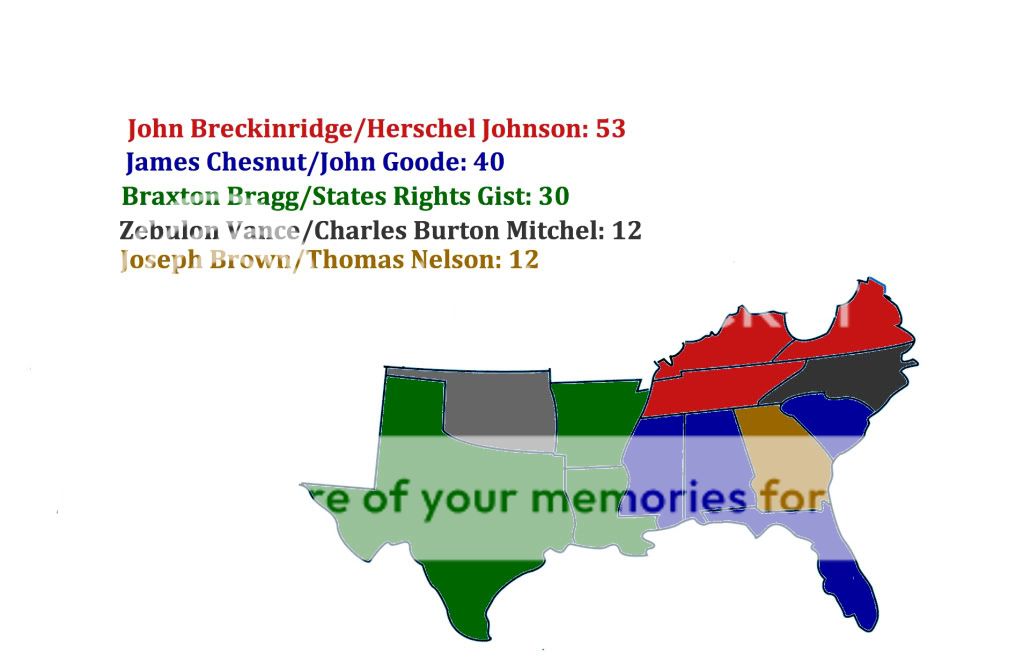Confederate States presidential election, 1873
The Confederate States of the 1860s and 1870s lacked political parties. Almost all Southern politicians of the era touted this as a virtue and a testament to the essential unity of the nation. In reality, the lack of organized political machinery often led to messy results.
The election for the third President is a case in point. There was no shortage of contenders; one authority has listed the following as serious candidates:
General-in-Chief Braxton Bragg, LA
Senator Richard Taylor, LA
Senator John Reagan, TX
General Joseph Johnston, GA
Senator Joseph Brown, GA
Governor Zebulon Vance, NC
Speaker James Chesnut, SC
Secretary of State John Breckinridge, KY
Attorney General Albert Gallatin Brown, MS
(The lack of a serious candidate from Virginia has been well noted by scholars, Vice President Seddon having chosen to retire to private life at the end of his term. Despite being the largest and richest Confederate state, the Old Dominion still took a backseat politically.)
As there were no political parties, there no national conventions, either. But 10 of 12 states did hold nominating conventions. (The Indian Territory, despite lacking electoral votes, held a convention of delegates from the Five Civilized Tribes, won by William P. Ross. Of the list above, only John Reagan's name was also put into nomination.)
These did much to winnow the field, especially where the contenders shared a home state. Joe Brown knocked out Joe Johnston in Georgia, while Braxton Bragg earned Louisiana's imprimatur over Richard Taylor. In the end, the only candidates to make the ballot in all twelve states were Breckinridge, Vance, Brown, Chesnut, and Brown.
Vance and Brown, while officially of no party like every other major politico, were well known as the core of the "opposition" in the states to the Davis and Beauregard administrations. They appealed largely to their own states and the Appalachian region in Tennessee, Kentucky, Alabama, and Virginia.
Bragg, the hero who had returned Kentucky to its rightful flag (though some darkly noted that he had been pressed by Buell until the sudden appearance of Kirby Smith), was hardly loved, even by his former soldiers. But he had one ace in the hole - founding father Jefferson Davis, who backed his old firned strongly. Davis wished to keep the martial traditions of the Confederacy strong, and of the field, only Bragg and Johnston had been to West Point, and the animosity between Davis and Johnston had become legendary at this point.
Chesnut had also served in the War of Secession as a citizen-soldier, and had been attached to Robert Lee's staff in 1863 before being elected to Congress later that year. He rose steadily in that body, becoming Speaker after Thomas Bocock entered the Beauregard cabinet.
John Breckinridge's biggest handicap was that he was a johnny-come-lately to the Confederacy, remaining in the US Senate until he was expelled in December 1861. Breckinridge rationalized it by claiming loyalty to his state first, and the southern Confederacy second, as Kentucky had yet to secede. He had served in the Confederate army also before taking a seat in the Senate, and then served as Beauregard's first Secretary of State.
The race that followed was the most chaotic the CSA or USA had ever seen, outstripping Lincoln's victory in the strange contest of 1860:
The candidates mostly split their sections: Breckinridge took the upper South, Chesnut the lower South, and Bragg won the West. Vance and Brown won their home states, and tended to split the opposition vote in the Appalachian counties of other states.
As no candidate won a majority of electoral votes, the election was thrown into the House of Representatives, where the states would choose from the top three contenders, using the unit rule. This gave Chesnut two major advantages: He had won a plurality of states, and he was liked and respected in the House, which he had run with a firm but fair hand for several terms. Even in states that did not support him on the first ballot, he tended to run second.
His selection of a Virginian as his running mate had proven prescient as well, as that state abandoned Breckinridge after one vote to join Chesnut. Breckinridge thereby notified his backers that he was withdrawing, and Ketucky and Tennessee followed, putting James Chesnut, Jr. of South Carolina over the top, making him the third Confederate President. The Senate soon followed, and selected John Goode of Virginia for Vice President. As a show of unity, both votes were unanimous on the final ballot, lest the United States think the Confederacy had become divided.



